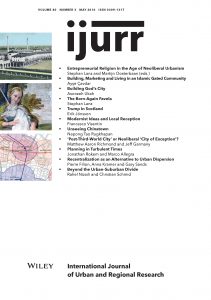The introduction to this symposium on entrepreneurial religion and neoliberal urbanism discusses leading scholarly approaches to religion and urban theory, arguing that, despite their merits, these approaches are in need of refinement. Theories on religion and urban theory too often describe religion as a reactionary phenomenon. Religious movements and spaces are generally defined as pockets of resistance and shelter against retreating or failing states under neoliberal restructuring programmes in the shadow of consumption dreams. Although religious actors and ideologies unquestionably form part of urban groups that are denied access to public and private means to wealth and security, the contributors to this symposium argue that within a global, comparative perspective, the entwinement of religion, state and market reveal more complicated configurations. Through a comparison of Islamic gated communities in Istanbul, Pentecostal prayer camps in Lagos and Pentecostal grassroots movements in the favelas of Rio de Janeiro, this symposium demonstrates that urban religion should also be regarded as a constitutive force of contemporary capitalism and should therefore be placed at the heart of the neoliberal construction of urban space instead of at its margins.
Details
Written by:
Stephan Lanz and Martijn Oosterbaan
Digital Object Identifier (DOI)
10.1111/1468-2427.12365
About DOI

